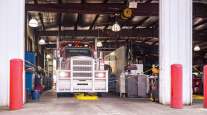Trucking Fleets Cite Maintenance Costs Among Benefits of Leasing Vehicles
By Denise L. Rondini, Special to Transport Topics
This story appears in the Jan. 13 print edition of Transport Topics.
Tom Hassel Transport Inc. has no maintenance facility, and company President Tom Hassel said he is not interested in setting up a shop. Instead, the Point Pleasant Beach, N.J., company leases many of its trucks and plans to phase out the ones it owns.
“It makes good business sense for a company like ours to have PacLease handle the maintenance,” Hassel said, referring to the leasing arm of truck manufacturer Paccar Inc.
Hassel leases 20 trucks from Hunter Peterbilt PacLease, based in Pennsville, N.J. — and said he plans to replace all the trucks in his 52-vehicle fleet with leased units. PacLease is a unit of Paccar Inc., which also owns truck makers Kenworth Truck Co. and Peterbilt Motors Co.
Hassel is not the only trucking executive looking to escape the financial and personnel issues involved with in-house truck maintenance and repair, leasing executives said.
“Folks are starting to look to outsourcing [maintenance work] where before they had their own shops,” said Dean Vicha, president of NationaLease in Downers Grove, Ill., “but the commitment to technology and the issues with hiring good technicians is just much tougher than it was in the past.”
And Dennis Cooke, president of Fleet Management Solutions for Ryder System Inc., said the company’s customers now are asking leasing companies to provide maintenance on-site. This request for in-house maintenance can eliminate a carrier’s need to train technicians and keep drivers from spending time transporting vehicles to and from maintenance shops.
In fact, some leasing customers are bundling emergency roadside assistance with the maintenance-scheduling package that leasing companies offer.
“Rolling the hardware cost and service package into the lease payment continues to gain acceptance and makes sense from a cost-predictability standpoint,” said Mike Parrish, national accounts leasing sales manager for Volvo Truck Leasing System and Mack Leasing System in Greensboro, N.C.
Another factor in some fleets’ decision is their desire to try natural-gas powered trucks by leasing a few, rather than making the commitment to buy them.
Ryder is seeing significant activity in this area, with 400 alternative-fuel vehicles that have been driven 15 million miles.
“We are expecting to have somewhere in the neighborhood of 1,000 units by the end of [this] year,” Cooke said. “We are partnering with customers in states where there are tax incentives and rebates available.”
Miami-based Ryder has vehicles in Arizona, California, Louisiana, Michigan, New York and Texas running on alternative fuels.
A major value of leasing versus buying trucks is that leasing companies offer carriers detailed analysis of how the carriers are using their trucks, often helping to keep the fleet at the right size and cull underused vehicles.
Fleets find that leasing companies can provide them with more data on the operation of their assets “because that helps them determine how they want to ‘spec’ their trucks in the future,” Vicha said.
“People are looking for transportation partners, and that is what [leasing companies] are,” said Tom James, CEO of the Truck Renting and Leasing Association, based in Alexandria, Va. “We are doing more than just providing vehicles; we are full partners.”
Fleets are experiencing “real sticker shock over the new truck technology — both on the acquisition front and on the maintenance cost side,” Cooke said.
“Customers continue to focus on their core business, rather than maintaining a fleet,” Parrish said. “Add in the increasing complexity of today’s trucks, and leasing makes even more business sense.”
Hassel was not necessarily experiencing sticker shock, but he did express concerns about new engine technologies.
“When it became clear that we would be working with new technologies to meet new emissions regulations, leasing trucks from PacLease made much more sense,” said Hassel, whose company hauls petrochemical products with a fleet of 50 tractors and 120 trailers.
Leasing also takes the guesswork out of the need to stabilize cash flow, said Shawn Rogers, national account manager in Canada for Volvo Truck Leasing System, which is a unit of Volvo Trucks in Greensboro.
“Fixed monthly costs allow companies to focus on the core function of their business,” Rogers said. “From the operational standpoint, a typical lease fleet is not in a position to deal with the inherent risks associated with the ownership of trucks, [such as] unpredictable maintenance costs and the cost of hiring, training and keeping technicians up to date on the latest technology.”
Stoneway Roofing Supply, which operates four other branches within a 100-mile radius of its home base in Seattle, is a big proponent of the benefits of leasing.
“By leasing our trucks, we can focus on what we do best — and that’s concentrating on providing timely and safe deliveries to our customers while relying on our leasing partner, Western Pacific Leasing, which is a PacLease local franchise, to maintain the trucks,” said Lonnie Peterson, senior vice president for the Western division of SRS Distribution Inc., the parent of Stoneway Roofing Supply.
By leasing trucks through full-service leasing programs, SRS said, it doesn’t have to commit financial resources that may be needed for other parts of the business.
Rising costs for trucks and maintenance also have prompted some fleet owners to turn to their lessors for help determining how many vehicles they need.
“Customers are trying to squeeze everything out of their transportation budget, so they are asking us to get creative in ways to cut costs,” NationaLease’s Vicha said.
Terry Dubowick, national account lease manager for Volvo Truck Leasing System, said the traditional full-service lease customer “is demanding a much higher level of utilization from the equipment they lease. For these companies, it is all about faster repairs, better service communication and less rental substitution.”
In the past, a fleet owner may have elected to keep additional trucks that weren’t regularly being used.
They were “kept around for surge capacity, and the fleet owner believed the vehicle was costing him nothing,” Cooke said, adding that the vehicle still needed to be licensed and maintained. “You start adding up the costs beyond depreciation, and you realize it actually is quite expensive to have extra vehicles in your fleet.”
Another reason trucking companies may want to consider using leased vehicles is that “leases usually offer lower monthly payments than loans [for buying trucks] and may have tax benefits . . . as well,” according to Daimler Truck Financial, based in Lisle, Ill., and a unit of Daimler Trucks North America.
A carrier may have a tax advantage, depending on the residual value of the vehicle when it is returned to the lessor and the state in which the transaction occurred, according to the Daimler Truck Financial website.
Daimler does not have a dedicated leasing unit, but it does lease trucks through Ryder and Penske Trucking Leasing Co., based in Reading, Pa., among other lessors.
Like Daimler, truck maker Navistar International Corp., in Lisle, Ill., doesn’t lease trucks directly, but carriers may lease them through IdealLease, “an entity formed by International truck dealers,” said Navistar spokesman Steve Schrier.
Penske Truck Leasing and Budget Truck Rental also offer International trucks.
Fleets also are looking to do more with less, Vicha said.
“They are using the assets in ways that allow them to maximize their investment,” the NationaLease executive said. “They are looking for ways to make the same amount of deliveries with a smaller fleet, for example.”
Steve Jastrow, strategic consulting service manager for GE Capital Fleet Services in Eden Prairie, Minn., said his company has a tool that looks at 40 different cost-saving opportunities to help its customers optimize their fleets.
“We show customers where room for improvement might be,” he said. “The tool we have helps prioritize what the fleet should be working on. If the fleet manager is focused on network utilization or fuel spending, we can quantify that that might not be where the greatest opportunity for savings is for that particular fleet.”
Mack Leasing System’s assessment, Parrish said, often includes site visits, driver and dispatch interviews and discussions with the customer’s financial team on the financial aspects of leasing, all with the goal of helping the fleet get the most value out of its investment.
“We do what is closer to a fleet audit,” said John Flynn, CEO of Fleet Advantage in Fort Lauderdale, Fla., “where we look at how many miles they run, what their vehicle configurations are, how many different models and types of vehicles they have, what their cost of maintenance is and what their [fuel] consumption is. We look at all the data we can in order to come up with the best program for them to manage the total cost of ownership.”
Flynn said the most important thing his company can do is manage the life-cycle cost of its customers’ vehicles.
“Left to their own, some fleets will keep trucks for seven or more years,” Flynn said. “We call that functional obsolescence.”
Fuel-use improvements play a big role in the obsolescence equation, he said, especially because truck makers are improving fuel economy by an average of 2% annually.
“If you sign up for a five- or six-year lease and are running 100,000 miles a year, I can guarantee you that, three years from now, a new truck is going to save you between $4,000 and $5,000 a year in fuel economy,” Flynn said.
Fleet Advantage calculates a truck’s fuel economy based on how many miles it has run, how much utilization the fleet is getting from that truck, which vehicles are not being used as much and what the maintenance costs are over the useful life of the vehicle. It also provides a projection of what it will cost to keep the truck for the next 12 months.
“With all the data analytics,” Flynn said, “the fleet starts to get a picture of what is going on and can start making comparisons between trucks in the fleet to determine if lower-performing vehicles can be improved or if it is time to replace them.”
Refrigerated fleet owners also are looking at vehicle usage.
“Companies, whether they are in food distribution or grocery, are looking at the best way to upfit and ‘spec’ that piece of equipment,” said Keith Shipp, CEO of PLM Trailer Leasing, based in Montvale, N.J., “so that they can do X number of deliveries to drive productivity with their drivers and their assets.
“We review the asset, then we review their business processes to figure out what may be impacting food integrity, the life cycle of the asset or productivity of the driver.”
PLM even rides along with the driver. Shipp said.
“This enables us to look at the loading practices and the food temperature,” he said. “Is the integrity of the food being kept throughout the day, or do you have frozen product that is defrosting?
“We do all the different maintenance services and all the telematics. We like to control costs and then work with the fleet if a unit is spiking in cost or if there is more downtime with one unit.”
Michael Nasinnyk, facility and equipment services manager for Neesvig’s Food Service in Windsor, Wis., said the meat and seafood regional hauler has a fleet of 15 leased Kenworth trucks with refrigerated bodies that serve customers mostly located in urban areas.
He said that Neesvig’s doesn’t run its own maintenance shop because of the costs of the technology and of training technicians on the new technology — particularly because of the possible citations for violations in the maintenance component of the Behavior Analysis & Safety Improvement Categories of the Federal Motor Carrier Safety Administration’s Compliance, Safety, Accountability program, commonly known as CSA.




